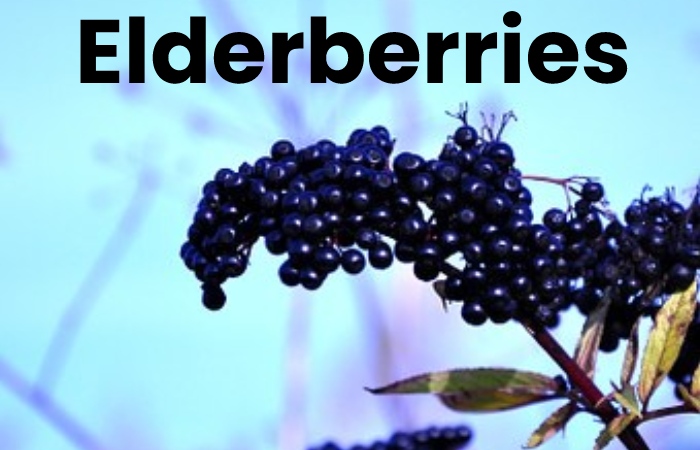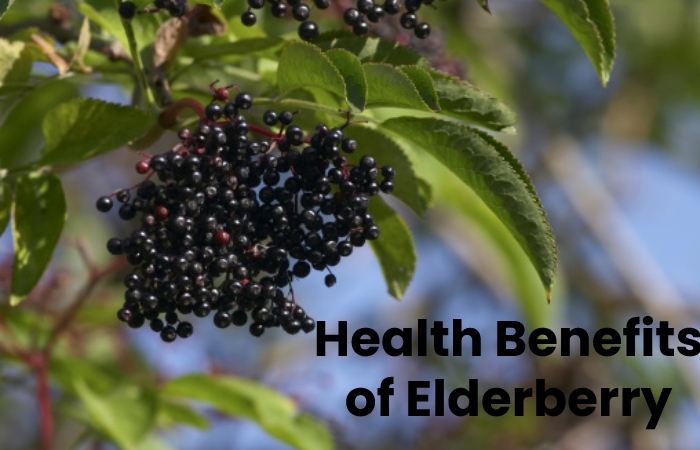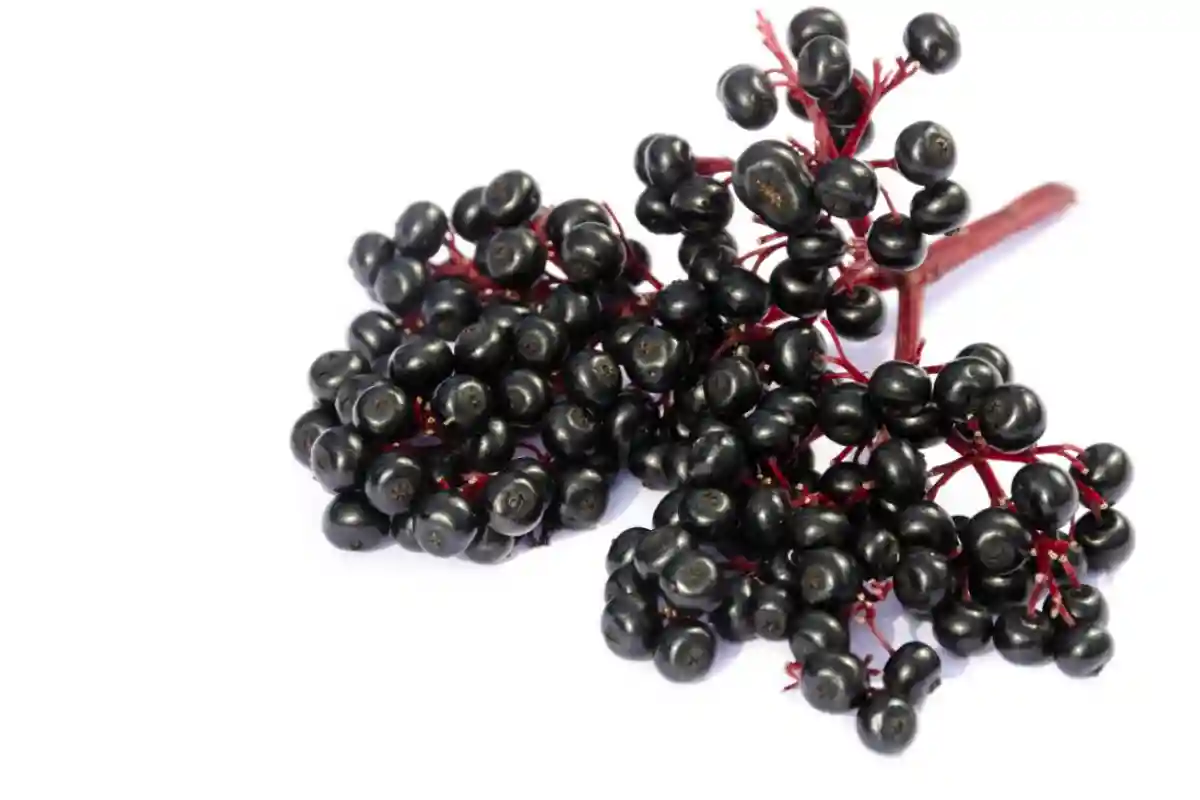Table of Contents
Nutritional Composition of Elderberries
The black or standard Elderberry, also known methodically as Sambucus nigra L., remains a tree innate to Europe. That belongs to the Caprifoliaceae family. Although one of the parts that can remain used from this tree is the flowers, here is the nutritional composition of elderberries :
Acids – Elderberries primarily feature malic acid, citric acid, and oxalic acid. To a lesser extent, they also provide linoleic acid and linolenic acid.
Elderberry Essential Oil:
Although elderflower covers a more expressive contribution, the berries also have oils such as alpha-terpineol, betulin, and geraniol. And also beta-amyrin.
Vitamins:
The fruits of this tree cover vitamins A, B1, B2, B3, B7, and C.
Minerals: it consumes potassium, iron, calcium, sodium, Mn, phosphorus, Mg, and zinc.
Additional Nutrients: Some other nutrients that elderberries provide include fiber, fructose, glucose, and flavonoids [anthocyanins and quercetin].
Elderberries:
Properties, benefits, and contraindications
Properties and benefits of elderberries
As we have understood in the preceding section, elderberries have a wide variety of vital nutrients for health. As the importance of this richness, the fruits of Sambucus nigra remain an excellent remedy for different conditions, as they have the following medicinal properties and benefits:
1. It Prevents some Heart Diseases
Elderberries remain the food with the highest concentration of quercetin, a flavonoid with powerful circulatory possessions that support the health of the arteries and our circulatory system. Thanks to these properties, elderberries remain among the finest foods for the heart. It can also prevent diseases such as cholesterol and hypertension. And also arteriosclerosis.
2. It is a good remedy for headaches
The fruit of this tree also has excellent anti-inflammatory and analgesic properties, which is why it is considered a magnificent remedy to reduce the discomfort caused by headaches.
To take advantage of these properties, the berries usually remain used to make a natural syrup. Although elderberry essential oil can also remain used. However, it remains critical that if you remain going to make a home remedy such as syrup or elderberry oil with these berries, you always consume them ripe because those that are still green contain a high dose of sambunigrina, a very toxic principle.
If you suffer from headaches often, don’t miss this article on Home Remedies for Migraines, where you will find a wide selection of tips to help you deal with headaches.
3. It has Astringent Properties – Benefits of Elderberry
Due to its high tannin content, Sambucus nigra berries have powerful astringent properties. Its astringent power gives it, on the one hand, laxative properties that improve some intestinal disorders such as constipation and, on the other hand, it prevents the appearance of stomach bacteria such as Helicobacter pylori. And how can we benefit from these properties?
4. Elderberries for cough
Elderberry is also an excellent remedy for relieving coughs and other symptoms such as fever, as it has powerful sudorific and antiviral properties. Thanks to these properties, the infusion of berries and elderflower is an effective remedy to promote the healing of some respiratory infections such as the flu, colds, and bronchitis.
If you want to discover more home solutions to end this annoyance, look at the following article on How to treat a cough with home remedies.
5. Reduces Fluid Retention
Thanks to their contribution of potassium salts, both elderflowers and elderberries have excellent diuretic properties that favor the elimination of toxins and accumulated liquids in the body. Due to this benefit, Elderberry is a perfect remedy for some conditions such as gout and dropsy.
Elderberries: properties, benefits, and contraindications – Properties and benefits of elderberries
6. Dangers and Contraindications of Elderberry
Although we have already seen what the Elderberry is for, and we have discovered that its flowers and fruits can be a good remedy for different ailments, it is also essential that we take certain precautions when consuming flowers or fruits of this tree:
The use of remedies made from this tree’s bark, leaves, and seeds remains not recommended. On the one hand, the seeds contain cyanogenic glycosides (which are cyanide generators), and, on the other, both the bark and its leaves have a toxic ingredient known as sambunigrin.
Fruits that are immature or green should not remain used either since, as we have seen in the previous section, they also contain sambunigrina.
In addition to its toxicity, Elderberry remains contraindicated in the following cases:
Gravidity and lactation: Due to the lack of toxicological studies on the effects during pregnancy and lactation, it remains not recommended to consume this plant in these cases.
People with hypertension, varicose veins. Or poor circulation: before taking any remedy with Elderberry, it remains recommended that you consult your doctor, as it could interfere with the medical treatments used for this type of case.
Beneficial Components in Elderberries
Elderberries contain organic pigments, tannins, amino acids, carotenoids, flavonoids, sugars, rutin, vibronic acid, Vitamin A and B, and many Vitamin C. They are also slightly laxative, diuretic, and diaphoretic. Flavonoids, such as quercetin, are believed to account for the therapeutic actions of elderflowers and berries. According to 2 laboratory studies, these flavonoids include anthocyanins that are potent antioxidants and protect cells from damage.
Health Benefits of Elderberry
Elderberries are listed in the CRC Manual of Medicinal Herbs as early as 1985 and remain listed in Mosby’s 2000. Drug Reference Nursing for colds, flu, yeast infections, nasal and chest congestion, and hay fever. In Israel, the Hadassah Laboratory of Oncology has determined that Elderberry stimulates the body’s immune system and treats cancer and AIDS patients with it. The wide range of medical benefits (after colds and flu to debilitating asthma, diabetes, and weight loss). Is probably due to enhancing each person’s immune system. Benefits of Elderberry
At the Bundesforschungsanstalt research center aimed at food in Karlsruhe. Germany, scientists conducting studies on Elderberry showed that elderberry anthocyanins improve immune function by increasing the manufacture of cytokines. These unique proteins perform as messengers in the resistant system to help regulate the immune response. Which helps defend the body against disease. Additional research indicates that the anthocyanins found in elderberries possess appreciably more antioxidant capacity than vitamin E or vitamin C.
Studies at the University of Graz in Austria found that elderberry extract reduces the oxidation of low-density lipoprotein cholesterol. Low-density lipoprotein oxidation remains implicated in atherogenesis, which contributes to cardiovascular disease.
Conclusion
Although we have already seen what the elderberry is for and. We have discover that its flowers and fruits can be a good remedy for different ailments

